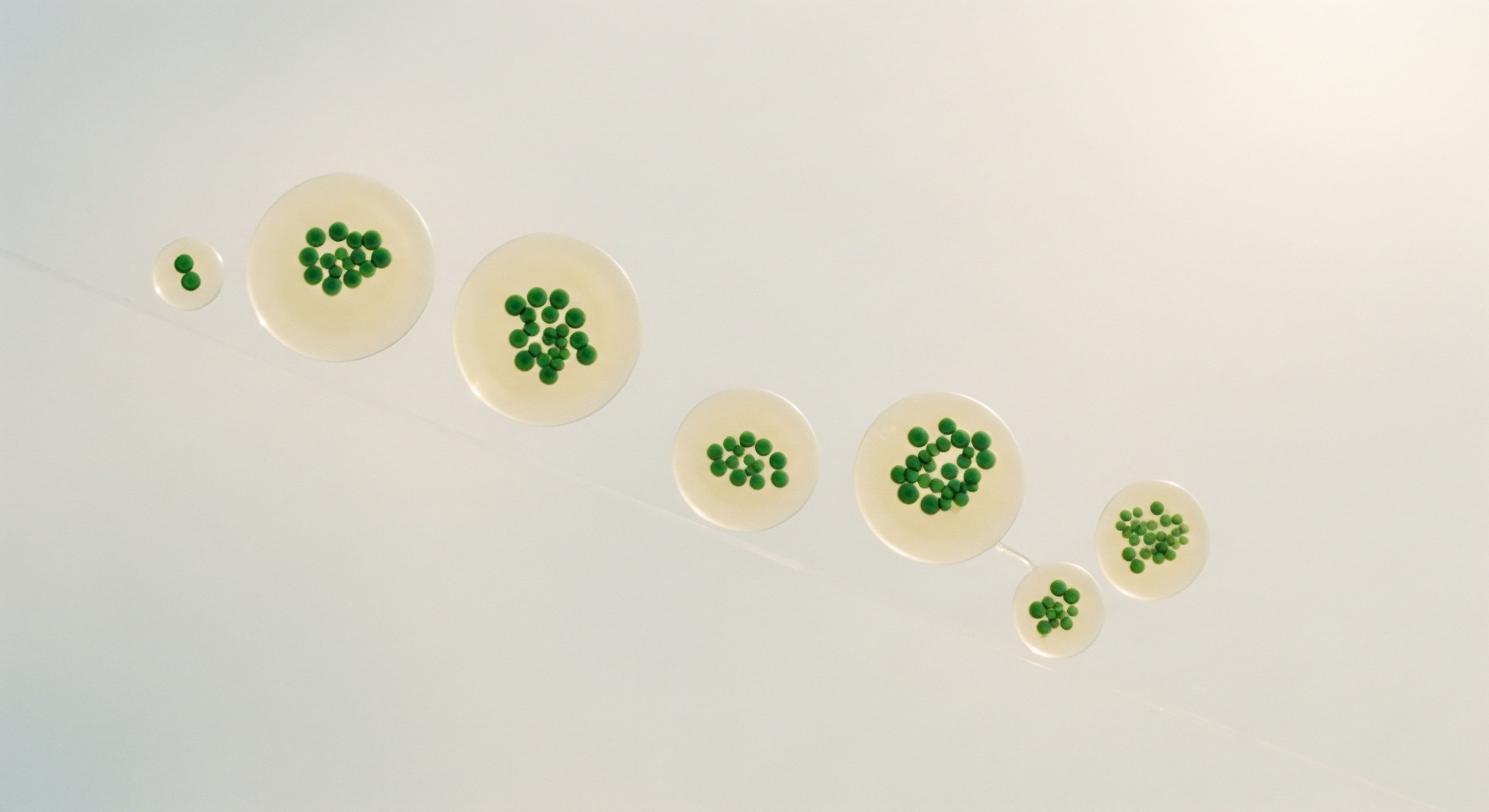

Fundamentals
The journey through in vitro fertilization often represents a profound personal undertaking, culminating in moments of immense hope and, at times, considerable physiological strain. As you navigate the period following IVF, a unique opportunity presents itself to recalibrate your biological systems, particularly the intricate endocrine network.
This post-IVF phase extends beyond immediate recovery; it invites a deliberate engagement with lifestyle adjustments designed to cultivate enduring hormonal balance and metabolic resilience. Understanding the profound interconnectedness of your internal messaging systems empowers you to reclaim a vibrant sense of well-being, fostering a state of sustained vitality.
The endocrine system, a sophisticated symphony of glands and hormones, orchestrates virtually every bodily function, from energy regulation to mood stabilization. IVF protocols, while remarkably effective, inherently involve significant hormonal modulation. This process can temporarily shift the delicate equilibrium of the hypothalamic-pituitary-gonadal (HPG) axis, the central command center for reproductive and overall endocrine function.
Post-IVF lifestyle adjustments serve as a potent mechanism for guiding this axis back toward optimal, self-regulating operation, extending benefits far beyond reproductive health alone.
Post-IVF lifestyle adjustments offer a critical opportunity to re-establish hormonal equilibrium and metabolic vitality.

Hormonal Rebalancing after IVF
Following the intense hormonal stimulation inherent in IVF, the body initiates a natural process of returning to its baseline endocrine state. Strategic lifestyle modifications can significantly augment this intrinsic rebalancing. Nutritional choices, for instance, directly influence substrate availability for hormone synthesis and receptor sensitivity. Prioritizing whole, unprocessed foods, replete with micronutrients and healthy fats, provides the necessary building blocks for endogenous hormone production.
Moreover, the gut microbiome plays a surprisingly influential role in estrogen metabolism, with certain bacterial communities affecting the enterohepatic circulation of estrogens. Supporting a diverse and healthy gut flora through dietary fiber and fermented foods contributes to a more efficient and balanced clearance of excess hormones, preventing recirculation that could prolong endocrine dysregulation.

Metabolic Resilience and Cellular Sensitivity
The metabolic system, intimately intertwined with endocrine function, also experiences the reverberations of IVF. Insulin sensitivity, a cornerstone of metabolic health, can be influenced by the hormonal milieu. Sustained lifestyle adjustments, particularly consistent physical activity and mindful dietary patterns, enhance cellular responsiveness to insulin.
This improved sensitivity contributes to stable blood glucose levels, mitigates systemic inflammation, and reduces the risk of long-term metabolic complications. The energetic efficiency of your cells directly impacts your overall vitality and how effectively your endocrine glands can perform their essential tasks.

The Role of Cortisol Regulation
The physiological and emotional demands of IVF can activate the hypothalamic-pituitary-adrenal (HPA) axis, leading to elevated cortisol levels. Chronic HPA axis activation can disrupt other endocrine pathways, including thyroid function and sex hormone balance. Implementing stress-reduction techniques ∞ such as restorative sleep practices, contemplative exercises, and engagement in enjoyable activities ∞ becomes paramount. These practices help modulate cortisol secretion, allowing the adrenal glands to recover and promoting a more harmonious endocrine environment.


Intermediate
For individuals conversant with foundational biological principles, the exploration of post-IVF lifestyle adjustments shifts toward a deeper understanding of specific physiological recalibration protocols. Sustained attention to these protocols after IVF extends a unique advantage, moving beyond mere symptom management to a proactive cultivation of enduring endocrine and metabolic health. This involves a precise engagement with dietary, movement, and restorative practices that actively support the body’s sophisticated self-regulatory mechanisms.
The intricate dance of neuroendocrine feedback loops, often temporarily altered during IVF, presents an opportunity for targeted support. Lifestyle choices become powerful modulators, guiding these loops back to their optimal set points. This approach recognizes that the body possesses an inherent intelligence, capable of re-establishing equilibrium when provided with the appropriate internal and external signals.
Targeted post-IVF lifestyle adjustments provide a powerful means to re-establish optimal neuroendocrine feedback and metabolic balance.

Optimizing the Hypothalamic-Pituitary-Gonadal Axis
The HPG axis, the master regulator of reproductive hormones, experiences significant influence during IVF. Post-treatment, its re-establishment of rhythmic pulsatility is paramount for long-term endocrine health. Specific nutritional interventions and exercise regimens can bolster this process.
- Dietary Lipids ∞ Adequate intake of essential fatty acids, particularly omega-3s, provides crucial precursors for steroid hormone synthesis. These lipids also modulate inflammatory pathways, which can otherwise impede HPG axis signaling.
- Protein Sufficiency ∞ Sufficient dietary protein ensures the availability of amino acids for neurotransmitter synthesis, supporting the hypothalamic signaling that drives GnRH pulsatility.
- Resistance Training ∞ Engaging in regular, moderate resistance training can improve insulin sensitivity and body composition, indirectly supporting the HPG axis by reducing systemic inflammation and optimizing metabolic signaling that influences gonadal function.

Enhancing Thyroid and Adrenal Synchronicity
The thyroid and adrenal glands operate in close concert with the HPG axis, forming a comprehensive neuroendocrine network. Post-IVF, supporting these glands becomes a critical aspect of holistic endocrine recalibration. Chronic stress, a common experience during IVF, can lead to adrenal fatigue and disrupt thyroid hormone conversion.
Consider the following strategies for enhancing thyroid and adrenal synchronicity ∞
- Adaptive Movement Practices ∞ Incorporating activities such as yoga, tai chi, or gentle hiking helps regulate the autonomic nervous system, thereby modulating cortisol release and supporting adrenal health.
- Micronutrient Repletion ∞ Ensuring adequate intake of selenium, zinc, iodine, and tyrosine provides essential cofactors for thyroid hormone production and conversion. Magnesium and B vitamins are critical for adrenal function and stress resilience.
- Circadian Rhythm Entrainment ∞ Adhering to a consistent sleep-wake cycle, optimizing light exposure, and minimizing evening screen time supports the natural ebb and flow of cortisol and melatonin, which profoundly influence both thyroid and adrenal output.

Personalized Nutritional Protocols
Personalized nutritional protocols move beyond general recommendations, tailoring macronutrient ratios and food choices to individual metabolic needs. Post-IVF, this might involve an emphasis on anti-inflammatory foods, blood sugar stabilization, and nutrient density to support cellular repair and endocrine gland function. A practitioner might guide you in identifying potential food sensitivities that could contribute to systemic inflammation, a known disruptor of hormonal harmony.
The impact of lifestyle adjustments on endocrine health can be quantified through various biomarkers. Regular assessment allows for iterative refinement of protocols.
| Biomarker Category | Specific Markers | Significance in Post-IVF Recovery |
|---|---|---|
| Gonadal Hormones | Estradiol, Progesterone, Testosterone, FSH, LH | Reflects HPG axis re-establishment and ovarian function. |
| Thyroid Function | TSH, Free T3, Free T4, Reverse T3 | Indicates thyroid health, energy metabolism, and stress response. |
| Adrenal Health | Cortisol (diurnal rhythm), DHEA-S | Assesses adrenal recovery and stress adaptation capacity. |
| Metabolic Markers | Fasting Glucose, Insulin, HbA1c, Lipid Panel | Evaluates insulin sensitivity, glucose regulation, and cardiovascular risk. |
| Inflammation | hs-CRP | Measures systemic inflammation, which impacts endocrine signaling. |


Academic
The long-term endocrine benefits derived from sustained post-IVF lifestyle adjustments represent a compelling area of inquiry, moving beyond a simplistic view of recovery to a sophisticated understanding of biological recalibration. This academic exploration necessitates a systems-biology perspective, dissecting the intricate interplay between the neuroendocrine axes, metabolic pathways, and cellular signaling cascades that ultimately dictate overall physiological resilience.
The post-IVF period offers a unique window for intentional intervention, capitalizing on the body’s inherent plasticity to optimize future health trajectories.
Our focus here centers on the profound influence of targeted lifestyle modifications on the HPG axis, metabolic homeostasis, and the broader neuroendocrine network. The acute hormonal perturbations inherent in controlled ovarian hyperstimulation (COH) during IVF demand a subsequent period of careful physiological re-equilibration. The efficacy of lifestyle interventions in facilitating this process, thereby mitigating potential long-term endocrine sequelae, warrants rigorous examination.
Post-IVF lifestyle interventions offer a potent strategy for optimizing neuroendocrine and metabolic function, extending beyond immediate recovery.

Recalibrating the Hypothalamic-Pituitary-Gonadal Axis Dynamics
The HPG axis, a finely tuned feedback system, is subject to significant exogenous modulation during IVF. Gonadotropin-releasing hormone (GnRH) agonists or antagonists, coupled with supraphysiological doses of exogenous gonadotropins, transiently suppress and then stimulate ovarian steroidogenesis. Post-IVF, the spontaneous resumption of endogenous GnRH pulsatility and subsequent gonadotropin secretion (FSH, LH) from the anterior pituitary is crucial. Sustained lifestyle adjustments, particularly those impacting metabolic health and systemic inflammation, exert a demonstrable influence on this recalibration.
Adipose tissue, recognized as an active endocrine organ, directly impacts HPG axis function through the secretion of adipokines such as leptin and adiponectin. Leptin, for instance, acts on hypothalamic neurons to regulate GnRH release. Maintaining a healthy body composition through consistent physical activity and balanced nutrition optimizes adipokine profiles, thereby supporting the re-establishment of physiological GnRH pulsatility.
Dysregulated metabolic states, characterized by insulin resistance and chronic low-grade inflammation, can suppress GnRH secretion and alter ovarian steroidogenesis, underscoring the necessity of metabolic vigilance.

Mitochondrial Biogenesis and Endocrine Signaling
The energetic demands of hormone synthesis and receptor signaling are substantial, placing mitochondria at the nexus of endocrine function. Lifestyle interventions promoting mitochondrial biogenesis ∞ such as high-intensity interval training (HIIT) and specific nutritional compounds like resveratrol and alpha-lipoic acid ∞ can enhance cellular energy production. Improved mitochondrial health directly supports the energetic efficiency of endocrine glands, ensuring robust hormone production and optimal receptor sensitivity. This contributes to the sustained functionality of the HPG axis and other endocrine networks.

The Epigenetic Landscape and Hormonal Sensitivity
Emerging evidence highlights the role of epigenetics in mediating the long-term effects of lifestyle on endocrine health. Diet, exercise, and stress management can induce epigenetic modifications, such as DNA methylation and histone acetylation, which alter gene expression without changing the underlying DNA sequence.
These modifications can influence the expression of hormone receptors, enzymes involved in hormone metabolism, and components of signaling pathways. For instance, dietary methyl donors (folate, B12, choline) contribute to DNA methylation patterns that can fine-tune hormonal responsiveness.
The profound impact of these epigenetic changes means that post-IVF lifestyle choices possess the capacity to sculpt the very responsiveness of your endocrine system at a molecular level, establishing a more resilient hormonal phenotype for years to come.
| Lifestyle Domain | Endocrine Target | Mechanistic Benefit |
|---|---|---|
| Nutrition | HPG Axis, Thyroid, Adrenals | Provides precursors for hormone synthesis, modulates inflammation, supports gut microbiome for hormone clearance. |
| Physical Activity | Metabolic Homeostasis, HPG Axis, Adrenals | Enhances insulin sensitivity, improves body composition, modulates adipokine secretion, reduces stress hormones. |
| Stress Management | HPA Axis, Thyroid, HPG Axis | Regulates cortisol secretion, mitigates adrenal fatigue, prevents downstream disruption of thyroid and gonadal hormones. |
| Sleep Hygiene | Circadian Rhythms, HPA Axis, Growth Hormone | Optimizes diurnal hormone patterns, supports growth hormone pulsatility, aids cellular repair and recovery. |

Interconnectedness of Neurotransmitter Systems and Hormonal Balance
The endocrine system does not operate in isolation; it maintains a constant dialogue with the central nervous system, particularly through neurotransmitters. Serotonin, dopamine, and GABA, for instance, profoundly influence mood, sleep, and stress responses, which in turn modulate hormonal secretion. Post-IVF, optimizing neurotransmitter balance through lifestyle becomes an indirect, yet powerful, means of supporting endocrine health.
Regular aerobic exercise increases brain-derived neurotrophic factor (BDNF), promoting neurogenesis and synaptic plasticity, which indirectly supports stable neurotransmitter levels. Dietary interventions, such as adequate tryptophan intake for serotonin synthesis or tyrosine for dopamine, provide essential substrates. This intricate cross-talk underscores the holistic nature of sustained wellness protocols, where mental and emotional well-being are inextricably linked to physiological equilibrium.

References
- Pasquali, R. et al. “Obesity and reproductive disorders in women.” Human Reproduction Update, vol. 11, no. 4, 2005, pp. 359-368.
- Chavarro, J. E. et al. “Diet and lifestyle in the prevention of ovulatory disorder infertility.” Obstetrics & Gynecology, vol. 110, no. 5, 2007, pp. 1003-1011.
- Wallace, D. C. “Mitochondrial genetics ∞ a paradigm for degenerative diseases and aging.” Science, vol. 256, no. 5057, 1992, pp. 628-632.
- Waterland, R. A. & Jirtle, R. L. “Transposable elements ∞ targets for early nutritional effects on epigenetic gene regulation.” Molecular and Cellular Biology, vol. 23, no. 15, 2003, pp. 5293-5300.
- Young, S. N. “How to increase serotonin in the human brain without drugs.” Journal of Psychiatry & Neuroscience, vol. 32, no. 6, 2007, pp. 394-399.

Reflection
Considering your personal health journey, what deeper understandings of your own biological systems have you uncovered through this exploration? This knowledge represents a powerful initial step. Your unique physiology demands a personalized approach, recognizing that true vitality arises from a nuanced understanding of your body’s intricate needs. Envision this information as a compass, guiding you toward a future where optimized function and sustained well-being become your lived reality.



